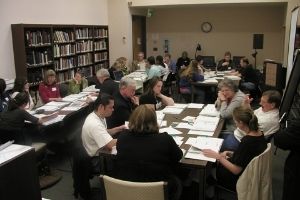Teaching Teachers

A blog post by Deborah Cardin, education director.
While the majority of the educational programs offered by the JMM focus on bringing school groups to our site for student field trip, providing professional development opportunities for teachers is a growing priority. Last year, we offered eight workshops on topics as varied as Holocaust education, immigration history, world religions, and making effective use of JMM resources. Together these programs reached 220 teachers from public, independent, Catholic, and Jewish schools and universities. Several programs take place here at the JMM while others take place at other museums, schools, and venues throughout the State. (Last year, my colleague Jeanette Parmigiani and I traveled as far Calvert County in Southern Maryland for a presentation on Holocaust best teaching practices at the Maryland Council for Social Studies.)
I am currently working on two very different workshops that are taking place the first week of November. The first is in conjunction with our current exhibition, A Blessing to One Another: Pope John Paul II and the Jewish People, and, in keeping with the theme of the exhibition, focuses on the importance of interfaith dialogue among educators of diverse backgrounds as a means for promoting tolerance.

The other is a program for Baltimore City Public School (BCPS) teachers sponsored through the Teaching American History program. This workshop’s theme is Ethnicity in East Baltimore with sessions exploring the history of the neighborhood surrounding the JMM.

So, how do we go about planning a program that provides teachers with a balance of content knowledge and pedagogical skills for teaching a specific topic? For the Blessing-related workshop, I am working closely with Jeanette Parmigiani (director of Holocaust Programs at the Baltimore Jewish Council) who always has terrific ideas for speakers and sessions. Our opening session will include an overview of the history of “The Parting of The Way”, documenting the path leading to the split between Jews and Christians led by educator extraordinaire, Father Robert Albright. This discussion will then help set the stage for a more detailed conversation about the history of antisemitism and the role of the Catholic Church during the Holocaust. We also rely on expert teachers who help frame a specific topic by sharing teaching techniques and strategies. Local educator Allene Gutin, who teaches at The Day School at Baltimore Hebrew Congregation, will lead a workshop demonstrating classroom resources for teaching about the Righteous, the few individuals who risked their lives to save Jews during the Holocaust. The program will conclude with a contemporary exploration of Jewish/Catholic dialogue since the Holocaust facilitated by Dr. Christopher Leighton, Executive Director of the Institute for Christian and Jewish Studies.
To plan the Baltimore City workshop, I have been working with Jennifer Frieman, who coordinates the TAH program for BCPS. The JMM has hosted three previous TAH sessions exploring a variety of themes such as immigration history and the history of religious pluralism in Maryland. The format for the TAH workshop is familiar: teachers spend the first hour listening to a scholar provide content on the given topic followed by a museum tour and review of relevant classroom resources. The afternoon is spent listening to master teachers share lesson plans on the topic that they have written that incorporate primary sources from the JMM archives. For some reason, this particular program has proven challenging to organize, and it has taken quite a few weeks to solidify speakers and participants. Fortunately, it is starting to come together thanks to the help of two of my colleagues, Anita Kassof and Deb Weiner who co-curated our Voices of Lombard Street exhibition. One of the highlights of this workshop will be a culminating panel moderated by Anita and Deb featuring former neighborhood residents of diverse backgrounds who will share their personal reminiscences of neighborhood life.
While developing the concept and organizing the myriad logistics for teacher training workshops is sometimes daunting, the benefits for the JMM are numerous. Teachers who participate in these programs become familiar with our Museum and are enthusiastic about the learning opportunities that we offer their students. Participants often become part of our Teacher Advisory Committee and serve as ambassadors to their schools and school systems on our behalf. In addition, they frequently take advantage of our programs and resources. And the education staff benefits from this opportunity to spend time with educators and to learn about the ways in which our Museum can improve the quality and relevance of our programs.
For more information about these programs and other JMM teacher training workshops, contact Deborah Cardin, director of education, at (410) 732-6400 x236 / cardin@jewishmuseummd.org.

